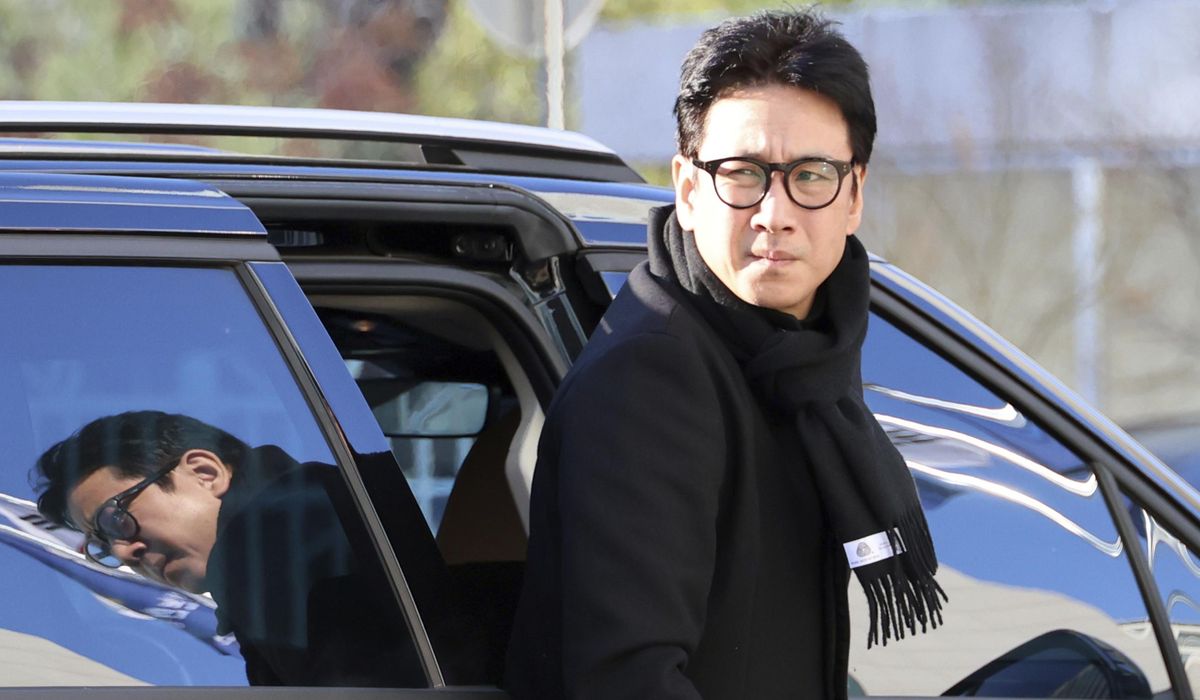SEOUL, South Korea — South Korean actor Lee Sun-kyun, famed for his role in smash-hit movie “Parasite,” but recently hit by drug allegations, died Wednesday in an apparent suicide.
In a country where high-profile suicides have made global headlines in recent years, the 48-year-old actor’s death prompted immediate national media attention.
South Korea’s Yonhap News Agency reported that Mr. Lee was found dead by police in his car at a mountainside park in Seoul. A charcoal heating briquette – a common instrument for Korean suicides, via carbon monoxide poisoning – was found in the vehicle.
The development came in the wake of local news reports that Mr. Lee had been grilled by police during the Christmas weekend over alleged drug use. He reportedly requested a lie detector during the questioning. His drug tests proved negative.
Per reports, Mr. Lee said he had been tricked into taking drugs by a bar hostess in Seoul’s Gangnam area, then blackmailed.
Mr. Lee gained acting fame with a breakthrough role in the 2007 South Korean television drama series “Behind the White Tower.” He later catapulted to global fame with his role as the wealthy family patriarch in the 2019 black comedy “Parasite.”
The South Korean film’s take on middle-class angst captured the world’s pre-COVID zeitgeist. In 2020, it became the first foreign-language film to win the best-picture Oscar in Hollywood.
The peculiarities of Mr. Lee’s case raise questions for family, friends and the authorities. The depressing frequency of suicides in South Korea – widely viewed as one of the world’s most successful nations – is a source of deep hand-wringing for the country’s wider society.
South Korean self killings
South Korea suffers the highest per capita suicide rate in the Organization for Economic Co-operation and Development (OECD), an international forum of 37 democracies with market-based economies around the world.
The South Korean rate of 24.1 per 100,000 people is more than double the OECD average of 9.7 per 100,000. While the elderly are most at risk, suicides of high-profile individuals are known to make headlines, and Korea observers see multiple factors at play.
Over the past half-century, South Korea has achieved middle-class prosperity and full democracy. National behaviors, aspirations and values are largely in sync with those of the West.
But with a traditional background in communal, rather than individualistic, traditions, South Korean social culture manifests in intense peer pressures. Some analysts say suicide is seen as an escape from shame or as a way to protest allegations of bad behavior.
Particularly at risk are entertainers, who are expected to be squeaky clean. Mortalities among this segment include hugely popular actress Choi Jin-sil who died by suicide in 2008, and Kim Jong-hyun, a vocalist of the South Korean boy band Shinhee, who died by suicide in 2017.
Under the skin
Outside observers often contend that conformity is an in-built part of South Korean society.
“The term in Korean for the public gaze is, ‘in other people’s eyes,’” said David Tizzard, who teaches Korean Studies at Seoul Women’s University. “When you do the recycling, you are being watched, so you do it properly; when you go out, you dress up, as you are being seen.”
When Mr. Tizzard’s foreign students complain that they are being stared at in public, he advises them that they are not alone: “That’s the way it is here.”
Celebrities are held to especially high standards.
Take BTS. One reason for the boy band’s global success is their vanilla image as well-behaved lads – very different from the “sex, drugs and rock and roll” lifestyle pursued by many Western contemporaries.
“Celebrity expectations in Korea are very different than in Western countries,” said Michael Breen, Seoul-based author of “The New Koreans.”
“We almost admire people who behave badly and whose lives are a mess and then there is a redemption story,” said Mr. Breen. “But in Korea, there is no admiration for someone who behaves badly.”
Attitudes toward drugs are unforgiving. In Western health systems addiction is widely seen as a health or mental health issue, and treated as such. In Korea, it is criminalized.
That generates high pressures in a judiciary where authorities have considerable leeway in garnering confessions. In a nation where recreational drug abuse is considered criminal, authorities are empowered to gain convictions.
Prosecution reform is a long-time political hot potato in South Korea, with many believing the system favors investigators over defendants.
Mr. Lee had reportedly spent 19 hours under police questioning during the Christmas weekend.
In the face of high conviction rates, “many commit suicide once they come to the attention of the justice system,” said Mr. Breen.
The combination of public shaming and the power of the prosecution are factors that have led to some high-profile suicides.
Those include the 2009 suicide of Roh Moo-hyun, a former president whose family faced a corruption probe, and the 2020 suicide of Park Won-soon, a mayor of Seoul who faced allegations of sexual harassment.
“Suicide is sometimes used in Korea as a form or protest, or to demonstrate innocence,” said Mr. Tizzard. “It clears the name.”
𝗖𝗿𝗲𝗱𝗶𝘁𝘀, 𝗖𝗼𝗽𝘆𝗿𝗶𝗴𝗵𝘁 & 𝗖𝗼𝘂𝗿𝘁𝗲𝘀𝘆: www.washingtontimes.com
𝗙𝗼𝗿 𝗮𝗻𝘆 𝗰𝗼𝗺𝗽𝗹𝗮𝗶𝗻𝘁𝘀 𝗿𝗲𝗴𝗮𝗿𝗱𝗶𝗻𝗴 𝗗𝗠𝗖𝗔,
𝗣𝗹𝗲𝗮𝘀𝗲 𝘀𝗲𝗻𝗱 𝘂𝘀 𝗮𝗻 𝗲𝗺𝗮𝗶𝗹 𝗮𝘁 dmca@enspirers.com



